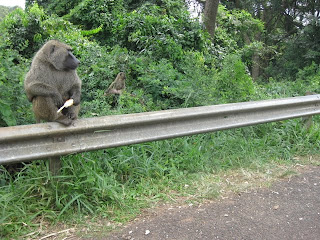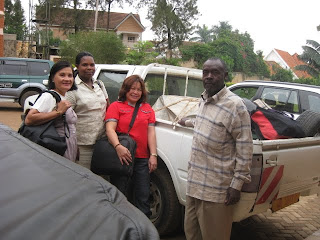One house is occupied by Judith, a Kenyan. She is a primary health care manager. Judith is very resourceful and she is on her mobile phone most of the time.
The other house is occupied by a Filipina, Dr. Angie. She is a general practitioner and has interest in HIV/AIDS. Angie loves to dress up, even at home, is very sociable, tidy, and hums when she cooks. I share the house with her, and she had been a great help in getting me settled at Okele Road, no number.
 The other house is occupied by a British couple, Mike and Liz.
The other house is occupied by a British couple, Mike and Liz.Mike is a community health support officer and has special interest in incidence of epilepsy and use of traditional healers. He is an artist and is also interested in recycling plastic bottles.
Liz is a community nurse and has special interest in TB and maternal and child health. She plays the flute on most nights and likes to bake.
Sometimes, Doug and Sandra, who are assigned to a nearby district would come over on weekends.
We cook our meals separately, do our own laundry and cleaning, have our own schedules, and go to different church services.
What do you do when you miss the ones you love - family, food, shopping, leisure, parlor, gym, spa, air conditioning, driving, brewed coffee, television, movie house, home movies, pet, garden, family trips, old friends, celebrations?
I get by with the help of my friends - the wonderful people at Okele Road, no number.
















































